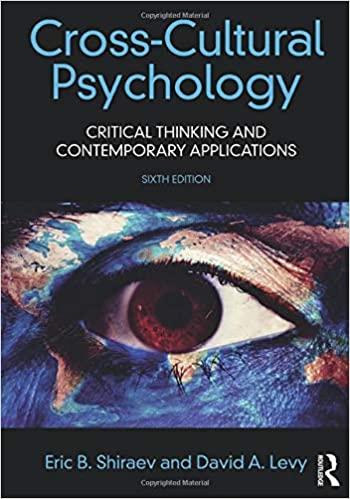Question
Hello, Please see below case scenario, answer the following questions using provided references. CASE STUDY: Katie Katie is a 14-year-old female who has been going
Hello,
Please see below case scenario, answer the following questions using provided references.
CASE STUDY: Katie Katie is a 14-year-old female who has been going to parties and drinking alcohol heavily. During the interview she exhibits symptoms of depression, her mood is subdued, her voice is low and she constantly stares at the floor. When questioned about how she is feeling, she replies, "I'm bummed out about my parent's divorce." Her father has left the family but visits Katie most weekends. Katie reports feeling sad and miserable, and she is sleeping more than usual. Katie doesn't feel like eating and has lost about 15 lbs. She can't keep her mind on her studies and her grades have dropped. Katie has been wearing baggy clothes, even in hot weather, and is avoiding family and friends. She was caught sneaking out of the house and drinking beer at a party last weekend. Katie's mother tells you that her attitude and behavior has changed since her father has been dating another woman. Her mother tells you that she also fears that the "girlfriend" may be abusing Katie and her two younger siblings, but is afraid to make any accusations, as she fears she may lose child support and custody of her children. When Katie is interviewed without her mother being present, she says that her father's girlfriend is really mean. When asked about what happens when the girlfriend is alone with Katie and her siblings, Katie first becomes very quiet, but then says that she gets slapped in the face and pushed around if she back-talks or refuses to do everything that her father's girlfriend demands. Katie recently came home with a red area on her cheek; Katie's mother shows a photo of this to the counselor.
References:
- Backlar, P., & Cutler, D. L. (2002).Ethics in community mental health care: Commonplace concerns. Springer.
- Henderson, K. L. (2013). Mandated reporting of child abuse: Considerations and guidelines for mental health counselors.Journal of Mental Health Counseling, 35(4), 296-307.
- Pabian, Y. L., Welfel, E., & Beebe, R. S. (2009). Psychologists' knowledge of their states' laws pertaining to Tarasoff-type situations.Professional Psychology: Research and Practice,40(1), 8-14.
- Rosen, A. L. (2014). Where mental health and elder abuse intersect.Generations, 38(3), 75-79.
- National Association for Alcoholism and Drug Abuse Counselors. (n.d.). Code of ethics. http://www.naadac.org/code-of-ethics
- Substance Abuse and Mental Health Services Administration. (2017).Addiction counseling competencies: The knowledge, skills, and attitudes of professional practice.U.S. Department of Health and Human Services. https://store.samhsa.gov/system/files/sma12-4171.pdf
Step by Step Solution
There are 3 Steps involved in it
Step: 1

Get Instant Access to Expert-Tailored Solutions
See step-by-step solutions with expert insights and AI powered tools for academic success
Step: 2

Step: 3

Ace Your Homework with AI
Get the answers you need in no time with our AI-driven, step-by-step assistance
Get Started


